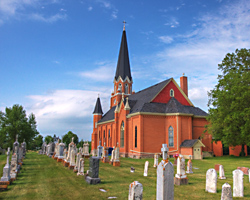 Yesterday, November 1, was the feast of All Saints. On that day, the church honors the whole communion of saints: all who walk in faith with Christ, our forebears in the faith whose witness has proceeded us. Many congregations also specifically remember those who have died in the last year. I’ve been thinking about funeral rituals and their relationship with Christian proclamation recently, and I’d like to propose that All Saints should be regarded as one of the most important occasions for the Church’s proclamation, along with Easter (and Holy Week) and funerals.
Yesterday, November 1, was the feast of All Saints. On that day, the church honors the whole communion of saints: all who walk in faith with Christ, our forebears in the faith whose witness has proceeded us. Many congregations also specifically remember those who have died in the last year. I’ve been thinking about funeral rituals and their relationship with Christian proclamation recently, and I’d like to propose that All Saints should be regarded as one of the most important occasions for the Church’s proclamation, along with Easter (and Holy Week) and funerals.
A friend of mine recently brought to my attention an article by Thomas Long in The Christian Century. In the article, The Good Funeral, Long speaks about Christian funeral practices and the changes in those practices over the last several decades, even the last century or so. He argues that there are aspects of funeral practice that are in need of recovery so that they can more clearly proclaim the Christian gospel. Long sees the funeral as a movement with the departed saint, tenderly bearing them along the final journey to God effused with hope in the resurrection. I recommend the article.
It is in the face of death that the Christian gospel and it’s proclamation gets tested. We have a faith that proclaims victory over death, yet we all die. And we fight against the cosmic Death that overwhelms our lives (we often call it sin). But we cannot overcome it by ourselves. The death of our loved ones forces this reality upon us, even if we do our best to push it away by regarding the body as “only a shell” or some such nonsense.
On Easter we proclaim the triumphant victory of Christ over death. The grave could not hold him. With St. Paul we proclaim that death has lost its sting. But Easter, for all its joy, can sometimes remain fairly theoretical, in the realm of grand ideas. This isn’t to dismiss the real joy, the real hope, the real gift of life that the proclamation of Christ’s resurrection on Easter brings us. At the funeral, this proclamation becomes distinctly personal, the general proclamation of Easter is applied to an individual. It gets applied to the deceased, and it gets applied to you and me, to those who mourn. Here we bring that central proclamation down to being “for you.”
All Saints, in reminding us of that great cloud of witnesses and the communion of the saints, is another time to remind one another that this Easter proclamation is both cosmic and personal. It is “for you” because it was for our loved ones who have proceeded us in death. The danger of All Saints could be that, without the physical body of the saints before us, we revert to the dominant cultural sense of who we really are is some sort of “soul” contained within the body’s shell which continues in disembodied existence, or that our dear ones are simply gone and live on in our memories alone. The hope of the resurrection is not a hope that skirts and denies death, but one that goes through it on the journey toward God and life in the New Jerusalem. Our remembrance of the faithfully departed, of all the saints of God, is not some “spiritual” exercise with disembodied, immortal souls. It is a recognition that, as whole, embodied people, God’s saints rest in his gracious embrace; that having been baptized into Christ’s death, their death is not the end of the story. All Saints is part of that journey, both of our accompanying our loved ones on their final journey to God, and in the saints accompanying us on our journey through life, fortifying one another in sure and certain hope of the resurrection to eternal life.